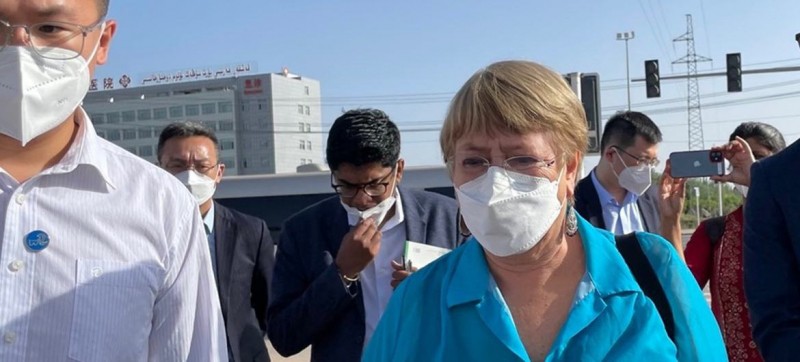High Commissioner Michelle Bachelet during her visit to China, in Ürümqi, Xinjiang Uyghur Autonomous Region, China. At the end of her official visit to China, the first such trip in 17 years, UN rights chief Michelle Bachelet announced new areas of engagement between her office and the Chinese Government on rights issues, and summarized the many rights issues raised during her six-day May mission. During Saturday’s virtual press conference, Ms. Bachelet, the UN High Commissioner for Human Rights, outlined the new opportunities for dialogue between her office and the Chinese authorities that were discussed during the visit, which include an annual senior strategic meeting, and a working group that will meet in Beijing and Geneva, as well as online. The working group, explained Ms. Bachelet, will discuss specific thematic areas, including development, poverty alleviation and human rights, minority rights, business and human rights, counterterrorism and human rights, digital space and human rights, judicial and legal protection, and human rights. The High Commissioner pointed out that, as her Office does not have a presence in China, the working group will allow for structured engagement on these and other issues, and provide a space for her team to bring specific matters of concern to the attention of the Chinese Government. During her mission, Ms. Bachelet spoke with a range of government officials, several civil society organisations, academics, and community and religious leaders. In addition, she met several organizations online ahead of the visit, on issues relating to Xinjiang province, Tibet, Hong Kong, and other parts of China. In Xinjiang, home to the Muslim Uighur minority, Ms. Bachelet raised questions and concerns about the application of counterterrorism and de-radicalisation measures and their broad application, and encouraged the Government to undertake a review of all counterterrorism and deradicalization policies, to ensure they fully comply with international human rights standards, and are not applied in an arbitrary and discriminatory way. On the Tibet Autonomous Region, Ms. Bachelet reiterated the importance of protecting the linguistic, religious, and cultural identity of Tibetans, and allowing Tibetans to participate fully and freely in decisions about their religious life, and for dialogue to take place. Regarding Hong Kong, Ms. Bachelet urged the Government to nurture – and not stifle – the tremendous potential for civil society and academics in Hong Kong to contribute to the promotion and protection of human rights. She described the arrests of lawyers, activists, journalists and others under the National Security Law as “deeply worrying”, and noted that Hong Kong is due to be reviewed by the UN Human Rights Committee in July. “To those who have sent me appeals, asking me to raise issues or cases with the authorities – I have heard you”, she declared. “I will continue to follow up on such issues and instances of concern on a sustained basis”. The UN High Commissioner for Human Rights Michelle Bachelet speaks at the Institute for Human Rights of Guangzhou The rights chief praised China’s “tremendous achievements” in alleviating poverty, and eradicating extreme poverty, 10 years ahead of its target date. The country, she added, has gone a long way towards ensuring protection of the right to health and broader social and economic rights, thanks to the introduction of universal health care and almost universal unemployment insurance scheme. A number of other developments in the country were welcomed by Ms. Bachelet, including legislation that improves protection for women’s rights, and work being done by NGOs to advance the rights of LGBTI people, people with disabilities, and older people. The UN rights chief underscored the important role that China has to play, at a regional and multilateral level, and noted that everyone she met on her visit, from Government officials, civil society, academics, diplomats and others, demonstrated a sincere willingness to make progress on the promotion and protection of human rights for all. Tibet, Xinjiang, and Hong Kong on the agenda

‘China has a very important role to play’
The World Organization for Development has been endowed with consultative status with the UN ECOSOC since 2014. The World Organization for Development, which has consultative status wich the UN ECOSOC, develops and implements Global Initiatives to achieve the UN Sustainable Development Goals.




Comments are closed.